“You are what you eat, so don’t be cheap, easy, or fake.” Unknown
“Let food be thy medicine, thy medicine shall be thy food.” Hippocrates
Both these adages convey the importance of food. Our health and the optimal functioning of our bodies depend on what nutrients we feed them. Regardless of age, we need vital elements or building blocks – protein, carbohydrates, essential fats, vitamins, minerals, and microelements. As we grow old, our nutritional requirements may change, but we still need the same food groups, just the proportions are different.
Our aging loved ones must follow a healthy diet as closely as ever since their bodies are prone to be quickly affected by salt, saturated fat, sugar, and lack of nutrients. These are detrimental to their health and can increase the risk of cardiovascular problems, diabetes, cognitive issues, and diminished energy levels.
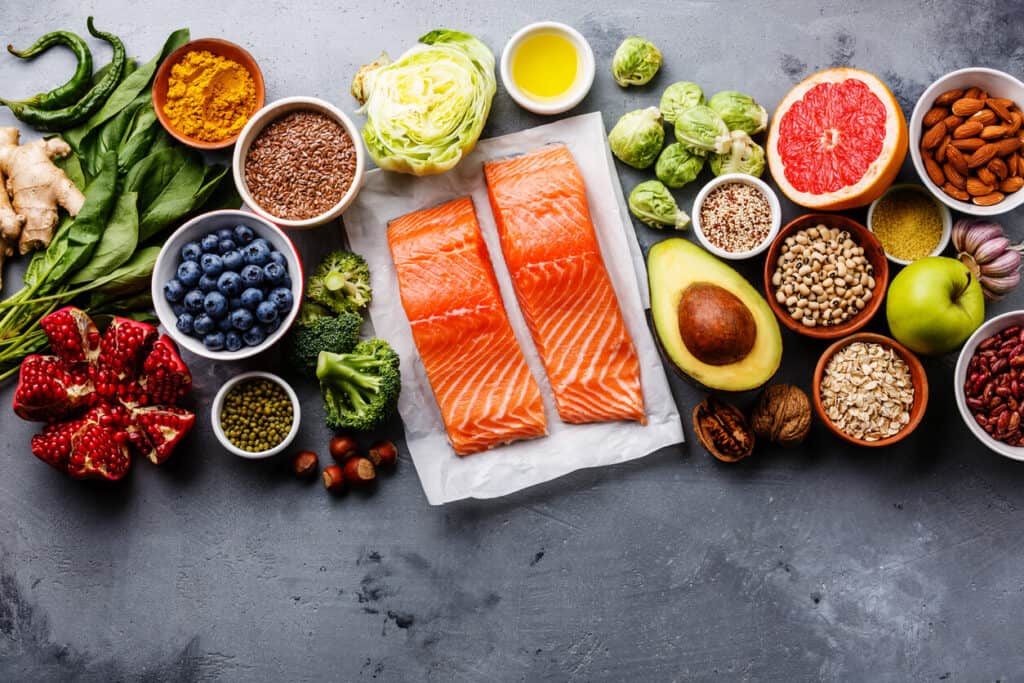
If you are a senior’s primary caregiver, you should ensure the house has whole food. If you prepare meals for them, you should incorporate as many superfoods as possible. And if you want a dependable caregiver to care for your beloved senior, you can trust Amy’s Eden to provide the best care. Seniors living in Amy’s Eden assisted home facilities have improved their diet and, as a result, their health.
What Are Superfoods, and Why Should They Be a Key Element of Seniors’ Diet?
Superfoods are nutrient-rich foods that are very beneficial for our health as they contain high amounts of vitamins, antioxidants, and minerals. At the same time, being mostly plant-based, these foods do not carry large quantities of substances proven to be damaging to our bodies. The word ‘super’ comes from the fact these types of food have a range of benefits, such as reducing blood pressure and the risk of heart attacks and cancer while improving cognitive function and overall well-being.
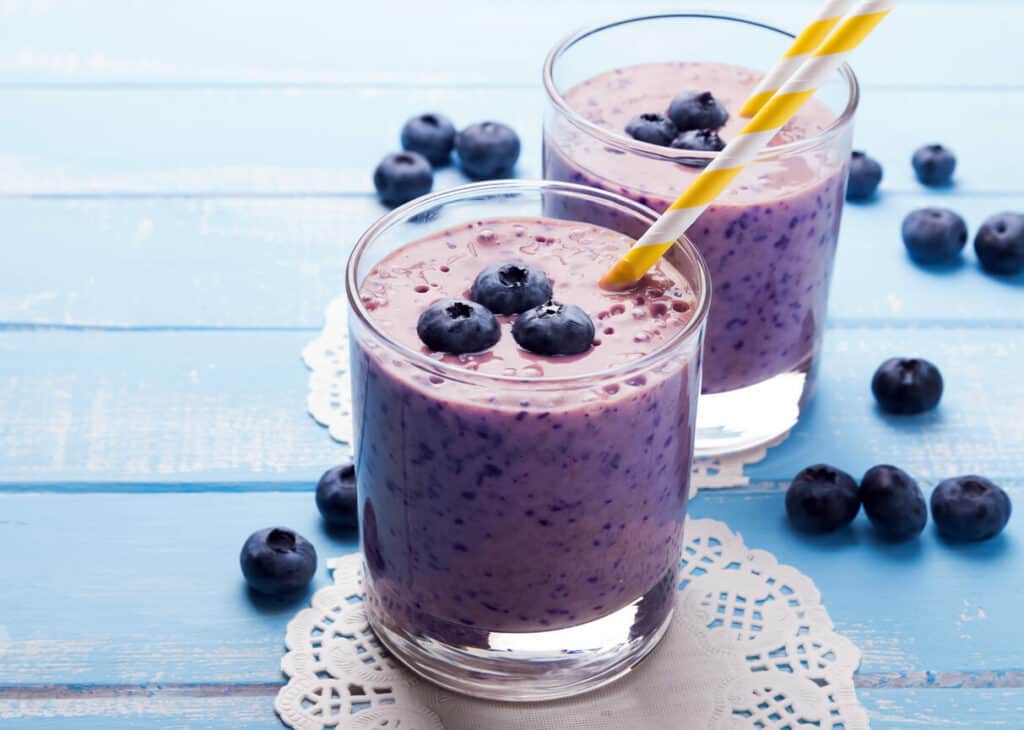
Some examples of superfoods are:
- Blueberries, acai, and golden berries are packed with antioxidants called anthocyanins, vitamin C, and fiber. A good nutrition habit consisting of these superfoods can help fight free radicals and decrease the risk of heart disease and cancer.
- Yogurt, kimchi, and kefir are all naturally fermented foods that are great for gut health and can boost the immune system of your senior beloved as they are rich in beneficial bacteria.
- Garlic, also called nature’s antibiotic, is known to have antibacterial, anti-inflammatory, and anti-microbial properties. Research has shown that garlic can also have a regulatory effect on people suffering from high blood pressure.
- Chia and flax seeds are loaded with omega-3 essential fatty acids. These seeds are also rich in protein. They can help improve digestion and lower cholesterol levels.
- Kale and other leafy greens have tons of vitamins A, K, and C, folate, and minerals like potassium, calcium, and magnesium. These vegetables are a great source of valuable nutrients. They help regulate blood pressure and decrease the risk of developing heart disease.
- Avocados are low in carbs and high in good omega-3 fats. These fruits are so versatile in the kitchen. Scientists believe that avocados can have antifungal, anti-cancer, and anti-inflammatory effects.
- Salmon is rich in omega-3 fatty acids, which can help reduce inflammation and lower the risk of heart disease.
- Quinoa, teff, amaranth, and farro are sometimes called ancient grains that have not been genetically modified and are naturally gluten-free. They contain loads of protein, minerals, fiber, and vitamin B and are a great source of antioxidants.
- Turmeric is a humble spice that contains curcumin and has anti-inflammatory properties. Studies prove that curcumin in turmeric alleviates some of the symptoms of inflammatory bowel disease, psoriasis, atherosclerosis, and COVID-19.
- Spirulina is derived from blue-green algae loaded with nutrients such as protein, vitamins, and minerals. It can boost the production of white blood cells and antibodies and thus help fight infections.

Superfoods are especially beneficial for seniors because they provide highly concentrated nutrients that can aid the healthy aging process. One of the effects of aging is the diminished ability to absorb and utilize nutrients from food. This can expose your senior loved one to an increased risk of malnutrition, followed by other health problems. Superfoods can close this gap and help older adults acquire the necessary nutrients to support their good health.
What Is the Recommended Daily Intake of Superfoods?
Seniors’ diet should include a wide range of nutrient-dense foods, i.e., fresh vegetables and fruit, whole grains, lean meat, and healthy fats. The key word here is variety. Seniors should aim to consume 1 ½ to 2 ½ cups of fruit and 2 to 3 ½ cups of vegetables per day, depending on their calorie needs.
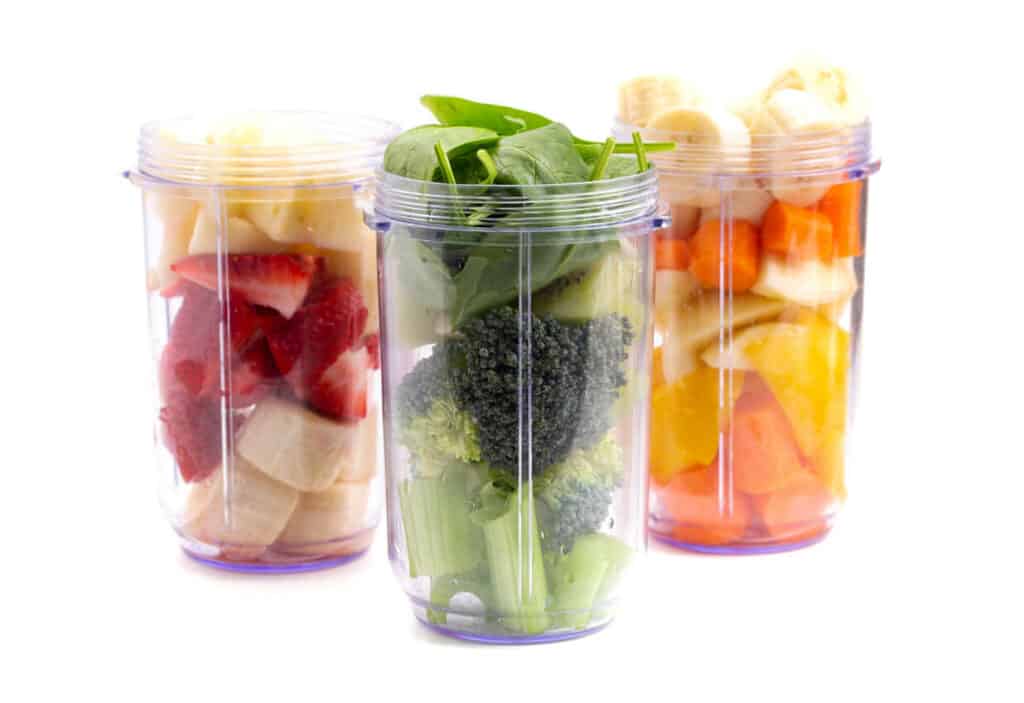
After turning 50, our bodies can start losing muscle mass quickly; therefore, we need more protein. While the average recommendation for protein consumption is around 0.36 grams, seniors should consume between 0.5 to 0.9 grams of lean protein per pound of body weight, especially if they want to continue having a physically active life.
Since there is no one ‘magic’ superfood, it is essential to note that a senior’s diet should comprise whole nutrient-rich foods that are well-balanced to offer all key macro and microelements indispensable for good health and wellbeing.
Below you can find some ideas on how to incorporate the different superfoods into your beloved senior’s diet. However, the best way to ensure they follow a healthy regimen is by helping them plan meals and providing them with diverse sources of superfoods.
Incorporating Superfoods into Everyday Meals
All superfoods are easily accessible all year round and available in big supermarket chains.
Blueberries are easy to find, fresh or frozen, and are a good addition to smoothies in the morning. In fact, they make a great smoothie ingredient list with other superfoods, like yogurt, leafy greens, chia, and flax seeds.
Smoothies are a healthy recipe choice for older adults as they do not require chewing and are sippable through a straw. Preparing a smoothie is easy and fast. The main equipment required is a powerful blender to which you can add all ingredients.
You can store blueberries in the freezer, as they freeze amazingly well. Then they can be a great addition to oatmeal bowls, healthy muffins, and cakes or salads.
Yogurt is best consumed plain, as other varieties can have too much sugar added. Plain Greek yogurt is an excellent substitute for mayonnaise in sauces and heavy cream in soups.
You can also use yogurt to marinate lean meat and poultry before baking or grilling it. It serves as a meat tenderizer and gives a slightly tangy flavor to the dishes. You simply need to let the meat rest in yogurt for 20 to 30 minutes before cooking it.
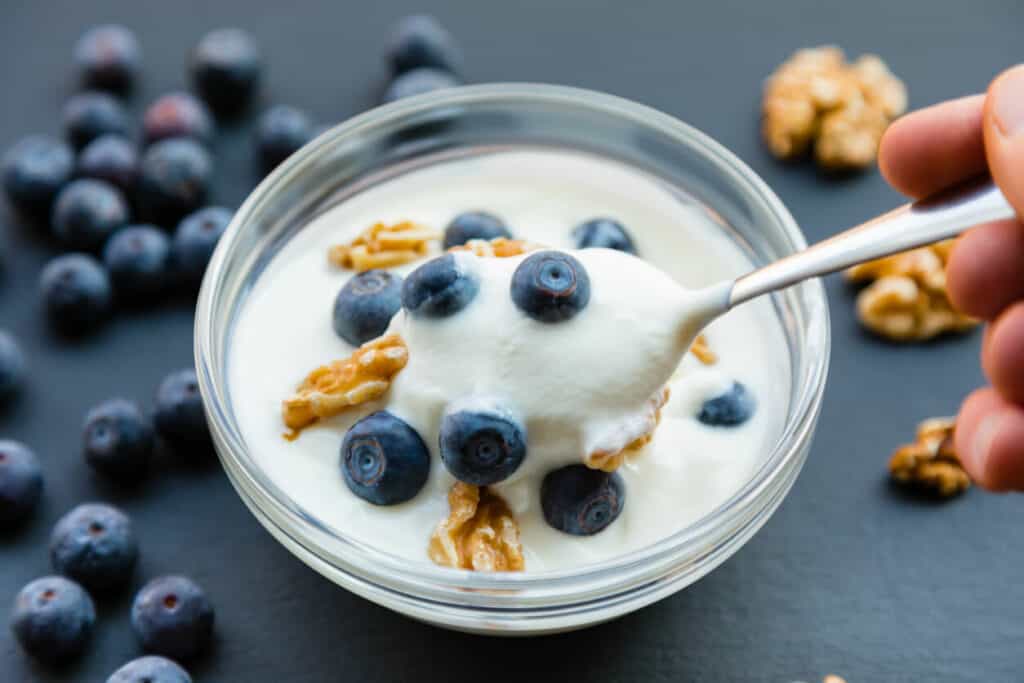
Chia seeds are a fantastic thickening agent. Added to overnight oats, yogurt, or chocolate pudding, they will solidify the mixture and produce a nice texture that is tasty and easy to consume. They don’t have a distinct flavor, so preparing a chia pudding with some almond milk, a tablespoon of honey, and fruit of your choice is a great way to incorporate a serving of fruit into your loved one’s diet.
Garlic is an ingredient in many cooked dishes. Still, you can try wrapping a whole bulb of garlic in foil, baking it, then using the delicious goodness as a spread over toasted wholewheat bread slices.
And did you know that you can easily ferment garlic? You need 3% salt brine, a mason jar full of peeled garlic cloves, and patience. The garlic will ferment in a few weeks, provided you keep it in a warm place. Then, you should move it to the fridge, where it will be good for at least six months.
Leafy greens like kale, spinach, and Swiss chard can be added to green smoothies, consisting of a handful of greens, a fruit like a banana, and a liquid like water, almond, or coconut milk. They are amazing side dishes for grilled fish, meat, or chicken. You can wilt them in a pan and add some pine or walnuts for crunch or a bit of cream to smoothen the flavor.
Once cooked, quinoa is a very versatile food. You can add it to cold or warm salads with avocado, tomatoes, red onion, and some olives. This simple combination, topped with olive oil, lemon, salt, and black pepper vinaigrette, is a nice twist to the Greek salad and a wholesome meal on its own. Quinoa is a great food to experiment with, and you can add it to dishes that typically call for rice or couscous.
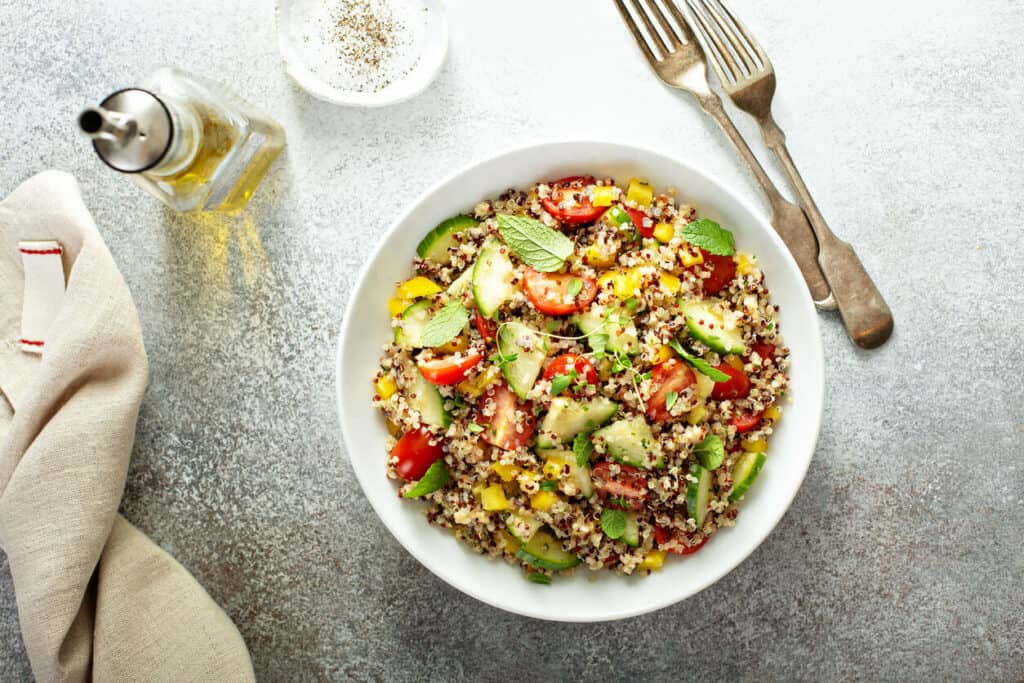
Salmon is typically sold in precut cutlets, filets, or cans. Its sweet taste makes it very palatable, and its high-fat content means that salmon is perfect for grilling, baking, or broiling. This fish has very few fish bones, making it a safe lunch or dinner choice for serving aging adults.
It does not turn dry like some other leaner fish types. If you want to experiment with some leftovers or canned salmon, you can make delicious and easy healthy salmon patties with amaranth.
Turmeric is an Asian spice that is a staple in Indian cuisine. It is incorporated in most curry dishes and some other typical Asian stews. Turmeric is bright orange and can stain your food, but its flavor is not too harsh.
In addition to curries, you can add it to steamed rice and quinoa, cauliflower or cabbage soups, omelets, and lentil dishes. If you are not sure it will be to the taste of your loved one, you can try adding just a tiny amount at first.
Spirulina can be the hardest superfood to incorporate into your senior family member’s diet. It comes in a powder form, and you can mix it with water to make tea, lemon juice for lemonade, or other fruit juice.
You can also add spirulina to smoothies, chai lattes, and breakfast bowls. Since it has a strong bitter taste, it is better to try masking it by adding it to sweet-flavored snacks and dishes.
Superfoods as the Key to Age-Defying Energy
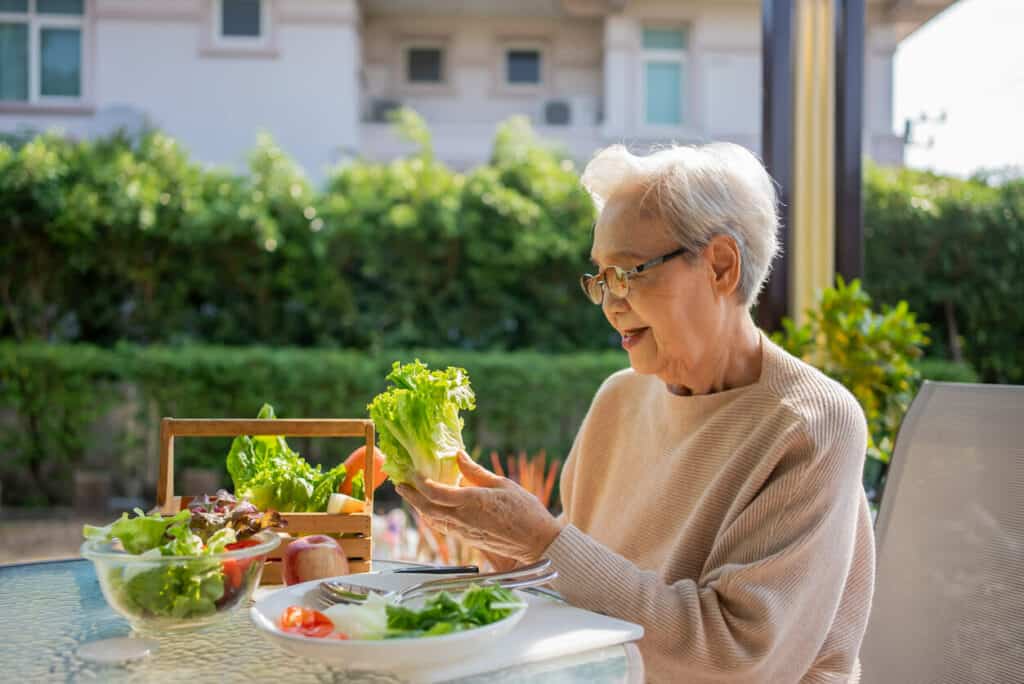
As you can see, superfoods are versatile and combinative. They can be used together and alone in many different meals. Most of them are suitable for vegan or vegetarian diets. Being nutrient-rich and easy to incorporate into the weekly menu are two great reasons to cook with them. Additionally, superfoods will help your senior loved one maintain energy level and satiation for longer.
Seeing food that looks and smells tasty, colorful, and appetizing can motivate your loved one to eat better. On the other hand, foods rich in antioxidants and healthy fats provide excellent nutrients for the brain and thus help slow down or prevent age-related cognitive decline and disorders.
You, as a caregiver, play an essential role in your loved one’s dietary habits. You not only supply the right foods for them or prepare their meals, but you also can share mealtimes with them. It is scientifically proven that we eat healthier and absorb better when we share our food with others. And we at Amy’s Eden assisted homes do the same, as meal times are social times for us.
Final Thoughts
Superfoods should be part of the daily menu of seniors, not only because they are nutrient-dense and easy-to-digest foods. They are a great natural tool for combating age-related ailments, such as elevated blood pressure, leaky gut syndrome, heart disease, cognitive decline, and worsened sensory perception. Superfoods can also help boost the elderly immune system and fight inflammation.

Having a large variety of ingredient choices such as spices, fresh fruit and vegetables, seeds and nuts, whole grains, legumes, lean protein, and oily fish means that your senior can enjoy the varied menu options. This can help avoid boredom and poor appetite due to repetitive meals and bland tastes. Moreover, allowing your loved one to experience healthy recipes with new flavors and textures may inspire them to prefer nutritious choices more often.
As a caregiver, you are responsible for promoting and providing healthy eating habits for your loved one and supplying them with the right foods to sustain those habits. By incorporating the superfoods mentioned earlier in the diet of your loved one and applying the tips we provided, you can assist them in creating a better quality of life in their golden years.
This is exactly what we at Amy’s Eden are also striving for. At our assisted living facilities, we care for our residents by going the extra mile. Our diabetic patients follow a special diet crafted for them by our nutritionists in collaboration with their doctors. And the rest of the seniors staying with us have a wide choice of superfoods and fresh produce at their disposal during meal times. These facts have contributed to the improved health and well-being of our residents.




